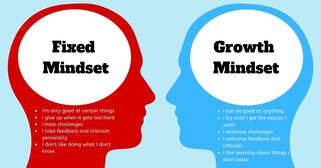Is Being "Clever" Enough To Ensure Success?  Do you struggle to achieve success in your chosen field? Some people do. Despite being “clever” in academic terms and passing lots of exams, some people find that this doesn’t translate into success in the workplace – or in other aspects of their lives. There has been a huge amount of research carried out on what makes some people successful and why some people, who you might think should be successful, just aren’t. These can be the people who did very well at school, passing exams and earning plaudits. But when they get into the workplace their trajectory slows down and, sometimes, stalls completely. While others, who didn’t do so well academically, move their careers forward over time, leading to observers sometimes saying “Wow, I never expected him/her to rise that high!”. Of course, some “clever” people do become very successful, but others don’t. Just an aside, Britain’s most famous Prime Minister, Winston Churchill, didn’t do too well at school and his teachers didn’t think he would ever amount to much, compared to his peers. “Wow, I never expected him/her to rise that high!”  There are many reasons why some people are successful and others aren’t and they have little to do with intelligence. Hard work plays a part, as does seeing opportunities when they present themselves - what we might call “luck”. But one of the main reasons is the way we see the difference between nature (what we are born with) and nurture (what we experience during our lives). Consider these questions. There are no right or wrong answers but choose between A or B for each one.
If you chose more A answers, it is probable you have what is called a “fixed” mindset (nature). If you chose more B answers, you probably have what is called a “growth” mindset (nurture).  A fixed mindset tells people that they are good at what they are good at and shouldn’t try to do things they aren’t good at. A growth mindset tells people that they can develop existing skills and also learn new skills, which means that they can become more skilful over time. Does this matter? Actually, when it comes to success, it does, What has this to do with publishing? We’ll tell you that at the end of the blog. So, please, stick with us. People with growth mindsets tend to be more successful in life than those who have fixed mindsets. This has less to do with “intelligence” and more to do with a willingness to learn. There are several reasons why this should be. "People with fixed mindsets put artificial boundaries around themselves"  As the 17th century poet, Richard Lovelace, wrote "Stone walls do not a prison make, Nor iron bars a cage". People with fixed mindsets put artificial boundaries around themselves. For example, one of the classic expressions we hear is “I’m a people person.” In other words, “I’m not going to get involved with anything technical.” People may see themselves as good at one particular thing, or a narrow range of things, but nothing else. We might call this their “comfort zone” and they are reluctant to step out of it. But people with a growth mindset don’t impose those sorts of boundaries on themselves, so they are more likely to invest in their own learning, which allows them to develop new skills which they can use at work - and in life. This allows them to take on work which people with a fixed mindset will avoid. People with a fixed mindset will learn, but they usually focus their learning on subjects they know they are good at, eg someone good at maths will study more maths rather than branch out and try to learn about psychology.  People with growth mindsets are more likely to engage in the coaching and mentoring of their teams, which means that their teams perform better, which benefits the company. The coach then gets the credit for developing their staff – they become recognised as a leader. People with fixed mindsets, on the other hand, will restrict people’s development activities to those necessary for their core duties, which means their team doesn’t develop new skills. The team becomes less flexible and less adaptable to sudden changes in circumstances. That can result in the “leader” being seen as the problem, which in turns leads to their career stalling. The fixed mindset leads people to take on work that is easy to do, which they can be sure of completing and earning easy praise. People with growth mindsets aren’t so afraid to take on challenging tasks, because they know they will learn from them. They will take the praise if it’s offered, but they are more interested in the challenge. "People with growth mindsets are more likely to seek out negative feedback" People with growth mindsets are more likely to take risks at work. This means that they rise to challenges that people with fixed mindsets will avoid. Again, it brings them to the attention of their managers, but that isn’t why they do it. Risky projects are more likely to present learning opportunities, which is beneficial to personal growth. And, hand in hand with risk, goes reward.  People with growth mindsets are more likely to seek out negative feedback than people with fixed mindsets. Negative feedback allows the individual to identify their weaknesses and work on them. Just attending to positive feedback doesn’t teach anybody anything. It’s why candidates attending job interviews are often asked about their weaknesses; it reveals the candidate’s attitude to personal growth. Fixed and growth mindsets tend to be established early in life. Children who are constantly praised for their results want more praise, so they focus on the things they are good at, where they can be sure of producing good results. But children who are praised for their effort rather than for their results, are more likely to develop growth mindsets. They know they will be praised for trying, even if they don’t always succeed, so they are more likely to keep trying. This encourages a risk-taking mentality and risk taking usually results in personal growth, one way or another. Unfortunately, teachers and parents are often results focused, rather than effort focused  This behaviour has been demonstrated in numerous research projects where those praised for trying, rather than for results, have tended to make the biggest improvements in their performance over time. It’s as though trying drives achievement, whereas consistent easy results drive complacency. If you are a parent reading this, don’t let me put you off praising your children for getting good results. But make sure that they know it was the effort that they put in that got them the results, not some innate and fixed “intelligence”. It is better to replace the words “clever” or “smart” with “hard worker”. And if their results weren’t quite as good as you had hoped, make sure you praise the child for their effort anyway and play down the actual results so they don’t become afraid of making mistakes.  It should come as no surprise that the world’s most successful companies are the ones that focus highly on staff development and learning. It is the key to innovation and innovation is the key to the future success of companies. But people with fixed mindsets don’t invest much in development and learning because they don’t think they need to, because they have always been told they are “clever”. The good news is that if people set their minds to it, they can change these early mindsets by making a conscious effort. Having a fixed mindset isn’t fixed for life! But it does need people to open their minds up to the possibility that they aren’t quite as “clever” as they have always been told – regardless of what it says on their diplomas. "Having a fixed mindset isn’t fixed for life!" If you have read this far you probably have a growth mindset and we could have predicted that you would stick around. The growth mindset in your make-up would have wanted to learn everything you could from this blog. Those with fixed mindsets stopped reading far earlier, shuffling off muttering about “psychobabble” and returning to do something easy which will earn them quick praise.  Earlier in the blog we asked “What has this to do with publishing? Now it’s time to answer that question. The answer is that the best authors aren’t the ones who do only what they are good at. They are the ones who take risks and learn from their mistakes. An author with a growth mindset will hunt down the toughest critics to be their beta readers, because it is those critics who will provide the most valuable feedback. Authors who rely on friendly beta readers or, worse, relatives to be their beta readers are displaying fixed mindsets, because those critics will provide the most positive feedback. But it doesn’t stop there. If an author has had their manuscript (MS) rejected by agents or publishers several times but hasn’t sat down and examined the MS and asked themselves what those rejections mean, they are displaying a fixed mindset. If their friendly beta readers have given them only positive feedback, then it must be the agent/publisher who is wrong for not appreciating their masterpiece.  The authors with the growth mindset will be treating each rejection as a learning opportunity and will be trying to find ways of re-writing their MS to make it more appealing to agents and publishers. Guess which type of author is more likely to end up with a publishing contract! Here at Selfishgenie Publishing, we don’t just reject an MS without any explanation. We provide feedback on why the MS didn’t appeal to us. In short, we become a highly critical beta reader. That feedback may not be welcomed by the author, in which case they will continue to receive rejections. But for those authors who recognise the value of the feedback, it is their opportunity to improve their MS and enhance their skills as an author. It is a step on the pathway to success. You’re welcome. But, of course, it also benefits us because next time the MS is submitted it will have been improved upon. OK, sometimes the improvement is so great that the author is snapped up by a larger publisher, but that’s a risk we are willing to take. If you have enjoyed this blog and want to be sure not to miss any future editions, just click the button below to sign up for our newsletter. We promise not to spam you. And, just a hint, if you have a growth mindset you are going to want to find out more.
0 Comments
Leave a Reply. |
AuthorThis blog is compiled and curated by the Selfishgenie publishing team. Archives
June 2025
|

 RSS Feed
RSS Feed